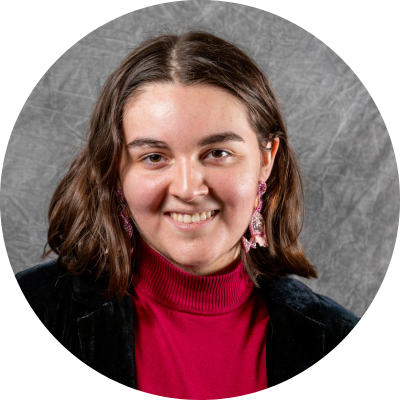Deacon Spotlight: Kaylah Bozkurtian
Kaylah Bozkurtian (2022 BA in Studio Art with Minors in Creative Writing, History, & Theatre)
Junior Designer, Brand & Communications at Penguin Random House in Charlotte Metropolitan Area, SC

Tell us about your current job role/employer and what you’re currently working on.
Earlier this year, I started a full-time Junior Designer, Brand & Communications position at Penguin Random House. My role has two major components: I design visual assets for Penguin Random House’s internal and external corporate communications (newsletters, journal ads, digital banners, etc.), and I provide design support for several of our company websites.
What personal and/or career experiences did you have prior to landing your current job and leading to where you are now?
After completing my Studio Art BA in 2022, I stayed at Wake Forest for an additional year as Wake Forest Fellow to the Office of Personal and Career Development. During my fellowship year, I worked directly with students, alumni, professors, and university administration to support Demon Deacons in their career development at Wake Forest and beyond.
In the months between the end of my fellowship and the start of my current position with Penguin Random House, I worked as a freelance illustrator.
What was the most challenging aspect of your first “real world job” and what did you learn from it?
I found the transition from an active student life to a sedentary 9-to-5 difficult. Hours on my feet in the theatre or studio were suddenly replaced with hours at a desk, and the strain that shift put on my physical and mental health was significant. I learned that a traditional desk job is only sustainable for me if I create structure for the interests and activities that vitalize me in my life outside of work—especially creative ones.
I’ve created that structure in a few different ways—joining group fitness classes, prioritizing sleep, and setting aside non-negotiable time for friends and family, among other things. Building bite-sized moments of rest into my daily routine has also helped me avoid burnout after stressful periods at work. Whether it’s a walk, an after-hours nap, or a commitment to not working through lunch, take steps to prioritize your own well-being—you can’t show up for yourself or anyone else if you’re running on empty.
What advice would you give to new Wake Forest graduates about developing their personal life habits after college (finances, health, values, work/life balance)?
Developing good habits early is one of the best things you can do for yourself. I know the payoff for those habits can seem far away—like “What do you mean I have to wait until I’m 59.5 to make penalty-free withdrawals from my retirement accounts?” far away—but time is on your side, so don’t waste it! Do your research, find trustworthy advisors, and get started. You can always make adjustments if you find that certain habits aren’t working for you.
How have you made personal and professional relationships in your city, company, or community?
I work remotely, so I’ve had to get creative when building relationships with my Penguin Random House colleagues based in NYC. Lunch “dates” have been a great way to get to know people, and I’ve also joined an internal “Coffee Pals” program that’s very similar to the Alumni Coffee Chats offered by the Alumni Personal and Career Development Center!
In terms of building relationships in the Charlotte area, I’ve found a few different avenues for connection: faith communities, group fitness classes, artisan markets, and arts festivals. I’m still fairly new to the city, but the more I explore, the more I’ve met people with shared interests and professional goals. It also doesn’t hurt that there’s a rather large Wake Forest alumni population in Charlotte!
Have you been mentored by anyone at Wake Forest or in your professional life? If so, what impact has that relationship had on you?
I’m grateful to a number of professors, supervisors, and peers who mentored me both formally and informally during my time at Wake Forest. Though it would be impossible for me to list them all here, I’d like to use this space to shout out a few of my most recent mentors: the wonderful Allison McWilliams (APCDC), Leigh Ann Hallberg (WFU Art), Alice Barsony (WFU Theatre), and Cindy Gendrich (WFU Theatre).
Each of my mentors has had their own unique approach to mentoring, but the common thread between them all has been their ability to ask insightful questions. They’ve challenged me to take tangible steps toward dreams I’d have otherwise left to die on the metaphorical vine, and their kindness, patience, and generosity have in turn made me a more kind, patient, and generous person. I’m incredibly privileged to have received the gift of great mentorship many times over—especially at such an early point in my career—so I’m always looking for opportunities to pay that gift forward.
What advice would you give to current Wake Forest students and/or young alumni who are about to start their first professional job?
If you’ve landed a job, that means multiple people—recruiters, hiring managers, soon-to-be colleagues—believe you’re capable of doing said job. Trust their positive assessment of you! Embrace the learning curve, ask for clarification when you need it, and be yourself. You weren’t hired to be anyone else.
What are your future career goals or plans? How are you being intentional about working towards them?
At some point, I’d love to pursue the “arts thing” full-time. I’m very happy where I am, and I find the stability of a traditional corporate job appealing in these early years post-graduation, but I still try to work toward a future artistic career in small ways—mainly by connecting with arts professionals and maintaining a a personal creative practice that’s entirely separate from the design work I do day-to-day.
Story published in May 2024. For current updates on Kaylah’s career path, visit her LinkedIn profile.
